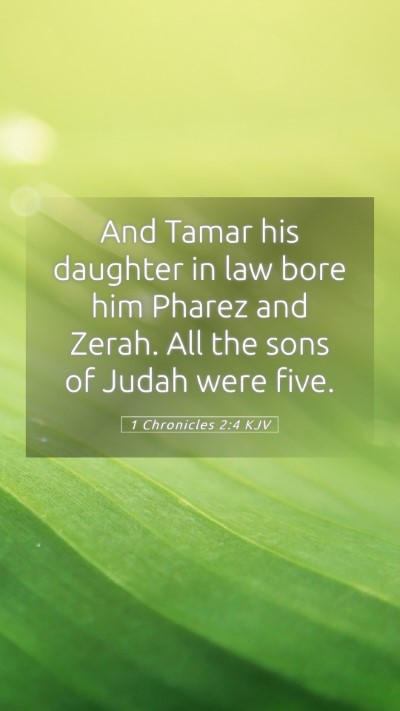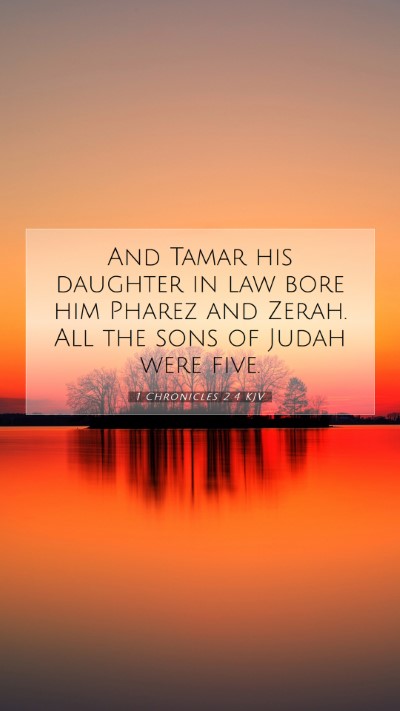Bible Verse Meaning: 1 Chronicles 2:4
Verse: "And Tamar his daughter-in-law bare him Pharez and Zerah. These were the sons of Judah." (1 Chronicles 2:4)
Introduction
The verse 1 Chronicles 2:4 offers a glimpse into the lineage of Judah, one of the tribes of Israel. It highlights the importance of genealogies in the biblical narrative, showcasing the significant role of Judah and his family in the unfolding story of God's covenant with His people. Understanding this verse requires a careful examination of its context and implications within the wider biblical framework.
Historical Context
Genealogies in the Bible serve as a vital tool for connecting history, divine promises, and the fulfillment of prophecies. Judah, one of the twelve sons of Jacob, was instrumental in the Israelite nation. His lineage plays a critical role in the messianic line, which is essential for understanding the birth of Jesus Christ.
Verse Explanation
Examining this verse through various commentaries offers deeper insights:
-
Matthew Henry:
Henry focuses on the significance of Tamar's role. Despite the circumstances surrounding her relationship with Judah, her inclusion in the genealogy emphasizes God's grace and the fulfillment of His plan through imperfect people.
-
Albert Barnes:
Barnes highlights how Pharez and Zerah represent two branches that emerged from Judah's lineage. He notes that Pharez became the prominent ancestor, eventually leading to David and, further down the line, Jesus. This underscores the importance of family heritage in the unfolding of biblical history.
-
Adam Clarke:
Clarke elaborates on the names mentioned, indicating the symbolic meanings associated with them. He draws attention to the significance of the twins' birth and how it reflects themes of struggle and victory that resonate throughout Scripture.
Theological Implications
This verse has profound theological implications, as it illustrates God's sovereign choice in using human lineage to bring about His purposes. It serves as a reminder of how God's plans often unfold in ways that are beyond human understanding, including the inclusion of individuals from diverse backgrounds and experiences in His redemptive plan.
Application in Modern Context
The lessons from 1 Chronicles 2:4 are relevant today, reminding believers of the grace and mercy of God. In our own lives, we may feel unworthy or struggle with our histories, yet this verse assures us that God can use anyone for His purpose. It encourages us to align our lives with His will, just as Pharez did, ensuring that we reflect the righteousness that God desires.
Cross-References
- Genesis 38:27-30: The account of Judah and Tamar that leads to the birth of Pharez and Zerah.
- Matthew 1:3: The genealogy of Jesus Christ, further linking His lineage to Judah and Tamar.
- Ruth 4:18-22: The genealogy of David, establishing the significance of Judah's descendants.
- Lamentations 5:2: Addressing the loss of heritage, which can contrast the importance of genealogies in the Old Testament.
- Romans 8:28: Highlighting God’s sovereign ability to work all things for good, connecting to the overarching theme of God’s grace seen in the lives of Judah and Tamar.
Conclusion
1 Chronicles 2:4 may appear simple at first glance, but it encapsulates profound themes of grace, redemption, and divine purpose. Through the genealogies, we see God's meticulous plan unfolding through flawed humanity. This understanding enriches our Bible study insights and strengthens our biblical exegesis, encouraging us to seek the meaning of Bible verses in their full context.
For those engaged in Bible study groups, this verse serves as an excellent topic for discussions about the nature of God's grace and the intricacies of His plans throughout biblical history. Utilizing Bible study tools and Bible study resources can further enhance an understanding of such verses, demonstrating the rich tapestry of God's Word achieved through diligent inquiry.


